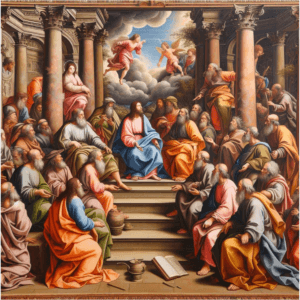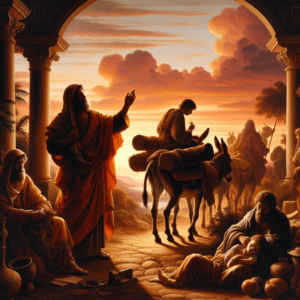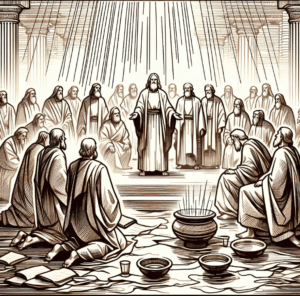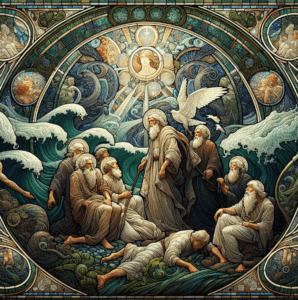GOD COMMANDS ABRAHAM TO OFFER ISAAC part-1
In this chapter we come to another great high point of the Bible. We are walking on mountain peaks in the Book of Genesis. Chapter 22 is the account of Abraham’s offering of his own son.
God commanded him to offer Isaac on the altar and then restrained him at the last minute when He saw that Abraham was willing to go through with it.
This chapter brings us to the seventh and last appearance of God to Abraham. After this, there is nothing more that God could ask Abraham to do. This is the supreme test that He brought to this man.
Genesis 22 contains one of the most iconic stories in all of literature: Abraham’s near-sacrifice of his son, Isaac. It’s a troubling story for many, mostly because it is so often misunderstood.
When read as part of the long, detailed story of Abraham, this is an event which reveals the depth of Abraham’s trust in God, one of the qualities God values most in His people.
Sometime after the birth of Isaac, while Abraham is still living in Beersheba, God speaks to him again. This time, God comes to test Abraham’s faithfulness and obedience with a very specific command.
Abraham is to take Isaac to the land of Moriah. There, he is to offer him as a burnt offering on one of the mountains (Genesis 22:1–2). God makes the command especially poignant by acknowledging up front that Abraham loves Isaac, his only son.
Most criticisms of this story start and end here: with the idea that Abraham would ever obey such a command from God. It’s important to realize, however, that this is not the first time Abraham has heard from God.
Nor is it the first time Abraham has been presented with a situation he does not fully understand. However, God faithfully provided a son to Abraham, even though Abraham could not see how it was possible (Genesis 17:17; 21:1–2).
God was righteous in His destruction of Sodom, saving Lot, even though Abraham didn’t understand how this could happen (Genesis 18:22–23; 19:15–16).
Now, Abraham has to decide if he trusts God enough to obey a seemingly impossible command, even when he does not fully understand how God plans to make things right.
Abraham doesn’t hesitate. He gets up early, summons two of his servants, along with Isaac, collects enough wood for a burnt offering, and loads up the donkey.
Genesis 22:1-5 KJV
[1] And it came to pass after these things, that God did tempt Abraham, and said unto him, Abraham: and he said, Behold, here I am.
[2] And he said, Take now thy son, thine only son Isaac, whom thou lovest, and get thee into the land of Moriah; and offer him there for a burnt offering upon one of the mountains which I will tell thee of.
[3] And Abraham rose up early in the morning, and saddled his ass, and took two of his young men with him, and Isaac his son, and clave the wood for the burnt offering, and rose up, and went unto the place of which God had told him.
[4] Then on the third day Abraham lifted up his eyes, and saw the place afar off.
[5] And Abraham said unto his young men, Abide ye here with the ass; and I and the lad will go yonder and worship, and come again to you.
Genesis 22:1 KJV
And it came to pass after these things, that God did tempt Abraham, and said unto him, Abraham: and he said, Behold, here I am.
 We never are secure from trials In Hebrew, to tempt, and to try, or to prove, are expressed by the same word. Every trial is indeed a temptation, and tends to show the dispositions of the heart, whether holy or unholy.
We never are secure from trials In Hebrew, to tempt, and to try, or to prove, are expressed by the same word. Every trial is indeed a temptation, and tends to show the dispositions of the heart, whether holy or unholy.
But God proved Abraham, not to draw him to sin, as Satan tempts. Strong faith is often exercised with strong trials, and put upon hard services. The words “after these things” indicate that some time has passed since the events of Genesis 21.
We will learn that Abraham is still living in Beersheba, but that Isaac has grown some. The last direct statement about Isaac’s age referred to his being weaned (Genesis 21:8), which would have been around the age of two or three.
In the upcoming verses, however, we see that Isaac can travel without his mother (Genesis 22:3–4), can converse in an adult manner (Genesis 22:7), and can carry wood for the sacrificial fire (Genesis 22:6).
Later verses indicate that Isaac will be around 36 or 37 when his mother, Sarah dies at the age of 127 (Genesis 23:1). Most likely, he is at least a teenager when he climbs the mountain with his father.
Genesis chapter 22 will describe God’s terrible test of Abraham’s faith. The word “test” is to be understood as something clearly different from a “temptation.” God will never tempt His people to do evil (James 1:13).
We see God test His people in Scripture, though, asking them to trust Him and obey in spite of their difficult circumstances (Exodus 15:25; 20:20; Deuteronomy 8:2; 13:3; Judges 2:22).
This is the key element missing when people misunderstand this part of Abraham’s story. His obedience is based, not in blind faith, but in an experienced, established trust based on what he has already seen God do.
God began this test by calling Abraham, and Abraham responded appropriately, ready to hear what God would say to him.
Genesis 22:2 KJV
And he said, Take now thy son, thine only son Isaac, whom thou lovest, and get thee into the land of Moriah; and offer him there for a burnt offering upon one of the mountains which I will tell thee of.
 The command to offer up his son, is given in such language as makes the trial more grievous; every word here is a sword. Observe,
The command to offer up his son, is given in such language as makes the trial more grievous; every word here is a sword. Observe,
- The person to be offered: Take thy son; not thy bullocks and thy lambs. How willingly would Abraham have parted with them all to redeem Isaac! Thy son; not thy servant. Thine only son; thine only son by Sarah. Take Isaac, that son whom thou lovest.
- The place: three days’ journey off; so that Abraham might have time to consider, and might deliberately obey.
- The manner: Offer him for a burnt-offering; not only kill his son, his Isaac, but kill him as a sacrifice; kill him with all that solemn pomp and ceremony, with which he used to offer his burnt-offerings.
Even to those who are familiar with this verse, the words of God to Abraham here land like a blow. Our first instinct is that this can’t be right.
Having followed the story of God in Genesis, through His relationship with Abraham and then, finally, the joyful birth of Isaac, the long-awaited son of God’s promise, these words of God just don’t fit.
That, of course, is exactly the point of God’s test. Would Abraham trust God even when God’s command did not seem to make any sense? That is the key element many people miss when interpreting this story.
This is not the first time Abraham has heard from God. Nor is it the first time God has acted in ways Abraham did not—at first—fully understand. And yet, in all of those past encounters, Abraham found that God’s unseen plans led to a righteous outcome.
Abraham’s response, shown in the next verse, is not an act of blind faith. It is an act of faithful trust. Our second human reaction to God’s command is that it feels cruel. Even knowing the end of the story, it challenges us to wonder about God’s character.
Earlier in Genesis, Abraham and then Ambimelech had both asked the Lord directly, “Will you kill the innocent?” The answer in both cases was “no.” God’s character was vindicated, as it will be here.
In the meantime, the command God has given seems impossibly harsh. God’s specific command to Abraham is to take the son he loves, the only son he has left (Genesis 21:9–14), to a mountainous area called Moriah, which would have been about 50 miles away.
Once there, Abraham is to offer Isaac as a burnt offering. God will show him on which mountain to make the sacrifice. A burnt offering involved slaughtering an animal and then burning it on an altar until it was completely consumed.
Such offerings were practiced by many religions. Abraham had offered animal sacrifices to the Lord. Human sacrifices of children to various false gods may well have been practiced in the land of Canaan at the time.
Later, God would forbid Israel from participating in child sacrifice.
Genesis 22:3 KJV
And Abraham rose up early in the morning, and saddled his ass, and took two of his young men with him, and Isaac his son, and clave the wood for the burnt offering, and rose up, and went unto the place of which God had told him.
 Never was any gold tried in so hot a fire.
Never was any gold tried in so hot a fire.
Who but Abraham would not have argued with God?
Such would have been the thought of a weak heart; but Abraham knew that he had to do with a God, even Jehovah. Faith had taught him not to argue, but to obey.
He is sure that what God commands is good; that what he promises cannot be broken. In matters of God, whoever consults with flesh and blood, will never offer up his Isaac to God.
One of the remarkable things about Genesis chapter 22 is that Abraham is not recorded as betraying any particular emotion. God’s command in the previous verse was to kill Isaac and offer him as a burnt sacrifice.
Rather than protesting or arguing, Abraham simply sets out to obey. We have seen Abraham express emotion and resistance in response to God’s commands before.
He was very displeased with the idea of sending his firstborn son Ishmael away, but he did so when God told him to do it (Genesis 21:9–14).
He laughed at the idea of Isaac’s birth in his old age (Genesis 17:17), and he even expressed his emotional desire to have Ishmael “live with God” (Genesis 17:18).
His lack of emotion or even any follow-up questions may be a clue that Abraham believes God will intervene to preserve Isaac’s life. In any case, his actions reveal his great confidence in God.
This confidence is, in fact, the entire point of this test. Many who criticize this story describe Abraham’s willingness to sacrifice his son as an act of evil.
Such criticism misses the foundation of Abraham’s obedience: Abraham trusts God to do the right thing, even though he cannot fully understand how.
Abraham did not see how God could give him a natural-born son; God gave him Isaac (Genesis 21:1–2).
Abraham did not see how God could destroy Sodom and Gomorrah without killing the righteous, such as his nephew Lot; God proved His justice and still saved Lot’s family (Genesis 18:23; 19:15–16).
So, Abraham’s actions here are exactly the opposite of “blind faith.” Abraham obeys because he has seen, first-hand, that God will do what is right, and that God’s plans do not require Abraham to understand every detail.
Abraham is trusting in what he already knows about God—he is not carelessly agreeing to murder his son. So, Abraham rises early in the morning to set out on the three-day journey to Moriah.
He quickly gathers what will be needed to do as the Lord has said: his donkey, two servants, wood for the fire, and Isaac. Isaac may well be a teenager by this time. The text refers to him as a “lad.”
Later verses will show that he is old enough to travel, to ask intelligent questions (Genesis 22:7) and to carry firewood (Genesis 22:6). Isaac’s part in this is not that of a frightened, kidnapped toddler. He seems to act with just as much willingness as Abraham.
Genesis 22:4 KJV
Then on the third day Abraham lifted up his eyes, and saw the place afar off.
 The good patriarch rises early, and begins his sad journey. And now he travels three days, and Isaac still is in his sight! Misery is made worse when long continued.
The good patriarch rises early, and begins his sad journey. And now he travels three days, and Isaac still is in his sight! Misery is made worse when long continued.
God has commanded Abraham to offer his son Isaac, whom he loves, as a burnt offering in the land of Moriah. Moriah was about 50 miles from Beersheba, where Abraham lived.
After a three-day journey with his donkey, two servants, all the wood needed for an offering, and Isaac, Abraham finally arrives at a place where he is able to see the mountainous region ahead of them.
Abraham’s willingness to obey this command is not an instance of blind faith. In fact, it’s exactly the opposite. Prior incidents in Abraham’s life have shown him that God can accomplish good, even when human beings do not fully understand how it is possible.
Isaac’s own birth was an example of God fulfilling a promise which seemed impossible, from a human perspective (Genesis 17:17; Genesis 21:1–2). Abraham is trusting his prior experience with God, assuming that God will—somehow—make this situation right.
Abraham obeys, not because he suddenly thinks God wants human sacrifice, but because he assumes, with trusting faith, that God is planning something behind the scenes.
Genesis 22:5 KJV
And Abraham said unto his young men, Abide ye here with the ass; and I and the lad will go yonder and worship, and come again to you.
 The expression, We will come again to you, shows that Abraham expected that Isaac, being raised from the dead, would return with him.
The expression, We will come again to you, shows that Abraham expected that Isaac, being raised from the dead, would return with him.
Interpreters of this event wonder: is Abraham convinced that God will intervene to stop him from killing Isaac before the moment comes? Or, that Isaac will be brought back to life?
We’re never told, exactly, but what Abraham says to his servants here is a clue. He tells them that he and the boy will go, worship, and come back again.
One way or another, Abraham seems to suggest that he expects Isaac to accompany him on the way back.
The term translated “boy” in the ESV is from the Hebrew root word na’ar, used to refer to “youths, lads, or young men.” Given the way Isaac speaks and works in this episode (Genesis 22:6–7), he’s probably a teenager, acting willingly alongside his extremely elderly father.
Abraham clearly trusted God. God explicitly told Abraham that He would establish His covenant with Isaac, as an everlasting covenant for his offspring (Genesis 17:19).
God had also said that it would be through Isaac that Abraham’s offspring would be named (Genesis 21:12).
Since Isaac had not yet had any children, God’s promise meant that Isaac must live on. Abraham has seen God turn seemingly impossible situations into examples of His righteousness and faithfulness in the past.
This included saving Lot, while destroying the wicked people of Sodom (Genesis 19:15–16). It certainly included the birth of Isaac, a “miracle baby” in every way (Genesis 17:17; 21:1–2).
Another clue to Abraham’s thought process is given in Hebrews 11:17–19. There we’re told Abraham believed God was able to raise Isaac from the dead.
Whatever Abraham expected to happen next, he does not hesitate to continue to obey God’s command to sacrifice the son he loved.
This is not because he thinks God actually wanted a human sacrifice; rather, it is because Abraham trusts God enough to obey, even when he does not fully understand.

GOD COMMANDS ABRAHAM TO OFFER ISAAC part-2
We don’t know exactly how old Isaac is at this point, but he is capable of travelling without his mother (Genesis 22:3–4), asking intelligent questions (Genesis 22:7) and carrying wood for his father (Genesis 22:6).
Most likely, Isaac is a teenager. The small group immediately heads out on the three-day trip to Moriah. Once there, Abraham leaves the servants and donkey behind and heads up into the hills with Isaac and the wood (Genesis 22:3–6).
Does Abraham expect God to stop him before he kills Isaac?
Perhaps, but perhaps not. Hebrews 11:19 gives us a clue: “Abraham reasoned that God could even raise the dead.”
In any case, Abraham doesn’t slow down even when Isaac asks where the lamb is. Abraham simply replies that the God will provide the lamb. Isaac, for his part, seems willing to cooperate with his father (Genesis 22:6–8).
Genesis 22:6-10 KJV
[6] And Abraham took the wood of the burnt offering, and laid it upon Isaac his son; and he took the fire in his hand, and a knife; and they went both of them together.
[7] And Isaac spake unto Abraham his father, and said, My father: and he said, Here am I, my son. And he said, Behold the fire and the wood: but where is the lamb for a burnt offering?
[8] And Abraham said, My son, God will provide himself a lamb for a burnt offering: so they went both of them together.
[9] And they came to the place which God had told him of; and Abraham built an altar there, and laid the wood in order, and bound Isaac his son, and laid him on the altar upon the wood.
[10] And Abraham stretched forth his hand, and took the knife to slay his son.
Genesis 22:6 KJV
And Abraham took the wood of the burnt offering, and laid it upon Isaac his son; and he took the fire in his hand, and a knife; and they went both of them together.
 “Abraham took the wood . . . and laid it upon Isaac his son.” Remember that Christ carried His own cross. The fire here speaks of judgment, and the knife speaks of the execution of judgment and of sacrifice.
“Abraham took the wood . . . and laid it upon Isaac his son.” Remember that Christ carried His own cross. The fire here speaks of judgment, and the knife speaks of the execution of judgment and of sacrifice.
Abraham is resolute. He continues on the path to obey God’s command by sacrificing the son he loves as a burnt offering.
Leaving the two servants and the donkey behind, Abraham and Isaac walk up toward the mountain together, Isaac carrying the wood for the fire, Abraham carrying the flame and the knife.
The fact that Isaac is able to carry the wood strongly suggests he is no child—more than likely, he is a teenager by this time.
Again, we’re given no hints as to Abraham’s emotional state. That does not mean Abraham is unconcerned; Scripture does not record every last detail in every situation.
All we know is that Abraham is following a path of obedience, based on his trust in God. This trust is grounded in the many times Abraham has seen God proven righteous, even when the situation seemed impossible.
The following verse will reveal that Isaac still has no idea what Abraham has planned. This, again, suggests a few things about Isaac.
An extremely old man would have been unlikely to overpower Isaac, meaning he was also acting in faith, by trusting his father Abraham.
Genesis 22:7 KJV
And Isaac spake unto Abraham his father, and said, My father: and he said, Here am I, my son. And he said, Behold the fire and the wood: but where is the lamb for a burnt offering?
 It was a very affecting question that Isaac asked him, as they were going together: “My father,” said Isaac; it was a melting word, which, one would think, should strike deeper in the heart of Abraham, than his knife could in the heart of Isaac.
It was a very affecting question that Isaac asked him, as they were going together: “My father,” said Isaac; it was a melting word, which, one would think, should strike deeper in the heart of Abraham, than his knife could in the heart of Isaac.
Yet he waits for his son’s question. Abraham and Isaac walk along together, climbing toward the spot where the sacrifice and burnt offering will take place. Isaac is carrying the wood. Abraham carries the flame and the knife.
Only Abraham, at this point, knows that God has issued a command for Isaac to be sacrificed on this mountain (Genesis 22:1–2). Abraham’s willingness to obey, despite such a dire request, is based on his trust in God.
Over and over, Abraham has seen God turn seemingly impossible situations into proof of His righteousness. So, Abraham obeys God out of well-established trust, not blind faith.
Finally, Isaac says, “My father.” Abraham responds as he did when God said “Abraham” at the beginning of this chapter: “Here I am.” He calls Isaac “my son.”
Isaac asks a logical question: Where is the lamb?
He clearly does not yet understand that he is to be the sacrifice. Abraham’s response in the following verse will not fully explain this to Isaac, either. Interestingly, though, Isaac will cooperate with Abraham even when he is bound on the altar.
A boy strong enough to carry firewood up a mountain would not have been overpowered by a man well over 100 years old. Isaac’s upcoming participation demonstrates his own trust.
This cooperation foreshadows the willing sacrifice of Christ some two thousand years later (John 10:17–18).
Genesis 22:8 KJV
And Abraham said, My son, God will provide himself a lamb for a burnt offering: so they went both of them together.
 Then Abraham, where he meant not, prophesies: “My son, God will provide a lamb for a burnt-offering.” The Holy Spirit, by his mouth, seems to predict the Lamb of God, which he has provided, and which taketh away the sin of the world.
Then Abraham, where he meant not, prophesies: “My son, God will provide a lamb for a burnt-offering.” The Holy Spirit, by his mouth, seems to predict the Lamb of God, which he has provided, and which taketh away the sin of the world.
Isaac and Abraham are walking together toward the spot where the sacrifice of a burnt offering will be made. Isaac has asked where the lamb is.
Abraham now responds somewhat cryptically: God will provide for Himself the lamb. What Abraham does not tell Isaac is that God’s command was for the sacrifice to be Isaac (Genesis 22:1–2).
Of course, Abraham’s willingness to obey this command is not driven by blind faith or evil. Instead, Abraham seems convinced that God has some plan, behind the scenes, to make all things right.
That fits perfectly with the experiences Abraham has had with God so far in his life: seemingly impossible situations working out to prove God’s righteousness.
Given his response, we’re left to wonder if Abraham imagines that God will indeed stop this and provide a literal lamb in some way.
Or, does Abraham mean that God has provided Isaac as the lamb for Himself, referring to Isaac’s miraculous birth?
Or, that God has provided Isaac as the sacrifice but intends to raise him from the dead?
We can’t fully know. In any case, Abraham does not flinch in continuing to move toward fulfilling God’s command. Judging by his actions, his faith in God’s goodness, character, and power remain absolute.
Touchingly, Isaac’s simple trust in his father also remains intact. A young man who can carry wood up a mountain could not be overpowered by an elderly man—when Isaac is bound on the altar, he has to allow it to happen (Genesis 22:9).
The two obviously care for each other. Abraham continues to show his willingness to give to God this boy he loves, trusting the Lord to do what is right.
Genesis 22:9 KJV
And they came to the place which God had told him of; and Abraham built an altar there, and laid the wood in order, and bound Isaac his son, and laid him on the altar upon the wood.
 Abraham lays the wood in order for his Isaac’s funeral pile, and now tells him the amazing news: Isaac, thou art the lamb which God has provided! Abraham, no doubt, comforting him with the same hopes with which he himself by faith was comforted.
Abraham lays the wood in order for his Isaac’s funeral pile, and now tells him the amazing news: Isaac, thou art the lamb which God has provided! Abraham, no doubt, comforting him with the same hopes with which he himself by faith was comforted.
Yet it is necessary that the sacrifice be bound. The great Sacrifice, which, in the fulness of time, was to be offered up, must be bound, and so must Isaac.
As we read through the story told in Genesis 22, we come very close to the moment we have been dreading. Abraham has been commanded by God to sacrifice his beloved son, Isaac (Genesis 22:1–2).
Abraham has obeyed, thus far, seemingly under the assumption that God has some greater plan or purpose in mind (Genesis 22:5). Abraham and Isaac arrive at the place God has shown to Abraham for the sacrifice.
Abraham builds the altar and lays out the wood on top of it. Then he prepares to do, but for the command of God, what would be unthinkable. He binds Isaac with a rope and lays him on the altar.
Did Isaac protest?
Did he struggle?
Or did he stand obediently without resisting and allow himself to be tied and laid out?
Did either Isaac or Abraham cry?
We’re not told any of these details, but what we do know of the story strongly suggests that Isaac was a willing participant. He’s old enough to ask questions (Genesis 22:7), and to carry firewood (Genesis 22:6).
He’s alone with an elderly man (Genesis 22:5). Since he could have easily run away from or overpowered Abraham, it makes the most sense to assume Isaac allowed himself to be bound.
Of course, Scripture does not say this directly, so we cannot be absolutely certain. What we know for sure is that Abraham continued to demonstrate his unshaken faith in God by willingly obeying this command.
He was clearly passing God’s test of his faith, showing that his love for the Lord was greater than his love for his son. Even though he does not understand, Abraham still obeys—this is the definition of “faith,” which in a biblical context means “trust.”
The other thing we know is that Isaac here serves as a picture of the very action taken by Jesus about two thousand years from this moment. Jesus, the Son, willingly allowed Himself to be sacrificed for the sins of the world by His Father God.
As Isaac did, Jesus carried the wood that was to be used in His own execution. Jesus, however, actually died as the sacrificial lamb, raised back to life as Abraham may have imagined Isaac would be (Hebrews 11:19).
Genesis 22:10 KJV
And Abraham stretched forth his hand, and took the knife to slay his son.
 This being done, Abraham takes the knife, and stretches out his hand to give the fatal blow. Here is an act of faith and obedience, which deserves to be a spectacle to God, angels, and men.
This being done, Abraham takes the knife, and stretches out his hand to give the fatal blow. Here is an act of faith and obedience, which deserves to be a spectacle to God, angels, and men.
God, by his providence, calls us to part with an Isaac sometimes, and we must do it with cheerful submission to his holy will, 1 Samuel 3:18. God had commanded Abraham to sacrifice his son Isaac, the son he loved, as a burnt offering.
Now that Isaac was bound and laid out on the altar, the moment had come. Again, Abraham’s confidence in God’s goodness, power, and character is so thorough that he does not appear to hesitate.
He takes the knife and prepares to kill his precious and long-awaited son. This is the moment of truth—the phrasing here clearly indicates that Abraham is taking action. He is not merely “holding” the knife and waiting for something to happen.
He is actively, obediently following the command given him by God. This obedience, of course, is not based in ignorance or blind faith.
Instead, Abraham is trusting God to do what He has done so many times before: work behind the scenes to do the right things, even when human beings cannot understand.
Before we read on to the next verse, in which the angel of the Lord calls out to Abraham to stop him, it’s worth taking a moment to consider God’s character.
Was the Lord cruel to ask this of Abraham?
Was God being capricious like the gods of mythology who casually tormented their human followers?
Such questions require some thoughtfulness. They should not be dismissed too quickly. God identifies Himself as love (1 John 4:8). He demonstrated His love to the universe by the sacrifice of His own Son for our sins (Romans 5:8).
He is the same God who asked Abraham to do what He Himself would later do with Jesus. Given what we see in the very next verse, God always knew that Isaac would not be harmed.
So, then, what was the point of all of this?
God’s purpose in testing Abraham’s faith will be clarified in the following verses.
I hope that you have really enjoyed this post,
Please Leave All Comments in the Comment Box Below ↓













This blog post offers a thorough exploration of the iconic story of Abraham’s near-sacrifice of his son, Isaac.
One aspect not explicitly addressed in the article is the significance of the location where this event unfolds: Mount Moriah. This mountain holds profound symbolism throughout biblical history, as it’s believed to be the same location where Solomon later built the Temple in Jerusalem.
Understanding the significance of Mount Moriah adds depth to Abraham’s obedience and underscores the divine plan unfolding throughout history.
Hello Jason,
Welcome to the HBS & DwJ platform.
Thank you so much for stopping by and adding value to this episode with your comment about the location where this event unfolds: Mount Moriah.
Blessings My Friend!
Hi there!
Your reflection on this biblical story really made me think about the complexity of faith and obedience in our lives.
It’s fascinating how ancient stories can still spark such relevant discussions today.
How do you think this narrative can guide us in facing modern-day challenges?
Thank you for your work and for sharing these insightful reflections!
Best regards,
Max
Hello Max,
Thank You for commenting on GOD Commands Abraham To Offer Isaac As A Burnt Offering.
God tested abraham, not to trip him up and watch him fall, but to deepen his capacity to obey God and thus to develop his character. Just as fire refines ore to extract precious metals, God refines us through difficult circumstances.
When we are tested, we can complain, or we can try to see how God is stretching us to develop in us the character necessary to be his followers.
Blessings My Friend!
What a wonderful take on such a classic Biblical story, I kept on reading till the very end.
I love how you provided a back story of Abraham as to the reason he fully trusted God. It was a process that God took him through and through that process, his faith was tested to be true.
There is no such thing as an overnight success story and Abraham is a testament to that. Though he had a lot of mistrust, in the beginning, leading up to sacrificing his son on the altar, each step that God took him through was one step closer to where He wanted him to be.
The same thing is true in life. Trust the process He takes us through.
Hello Nathan,
Welcome to the HBS & DwJ platform. It is a pleasure to learn that you feel this is a wonderful take on GOD Commands Abraham To Offer Isaac As A Burnt Offering (G-22-HBS). I definitely agree that we must trust the process of life.
Come back again,
Blessings My Friend!
The blog post provides a detailed and insightful commentary on Genesis 22, emphasizing the depth of Abraham’s faith and trust in God during the near-sacrifice of his son, Isaac.
The narrative underscores the distinction between divine testing and temptation, demonstrating God’s righteousness and the ultimate fulfillment of His promises.
Reading this post, I felt enlightened and moved by the profound analysis and reflections. Overall, the post effectively combines theological analysis with practical reflections, offering both depth and relevance to modern readers.
Thank you for sharing!
Hello Kavitha,
I appreciate you taking the time to let me know that you feel that the story of GOD Commands Abraham To Offer Isaac As A Burnt Offering (G-22-HBS) provides a detailed and insightful commentary on Genesis 22.
Your comments are definitely appreciated, I’d love to hear back from you about other episodes.
Thanks for stopping by,
Blessings My Friend!
I just happened to stumble upon your website while surfing the internet.
For the past 10 years or more, I have been trying to learn about God and the bible better. I have read the bible several times, but some things just are difficult for me to understand on my own.
God commands Abraham has been a very interesting read for me, I enjoyed learning about Abraham through your easy to understand article. You have made studying the bible so much easier for me.
I shall return again soon to learn more
Jeff
Hello Jeff,
It is great reading this comment from you. It most certain pleases me to learn that you are learning some thing from this post.
Thank you so much for your continued support.
Please Have A Blessed Day!